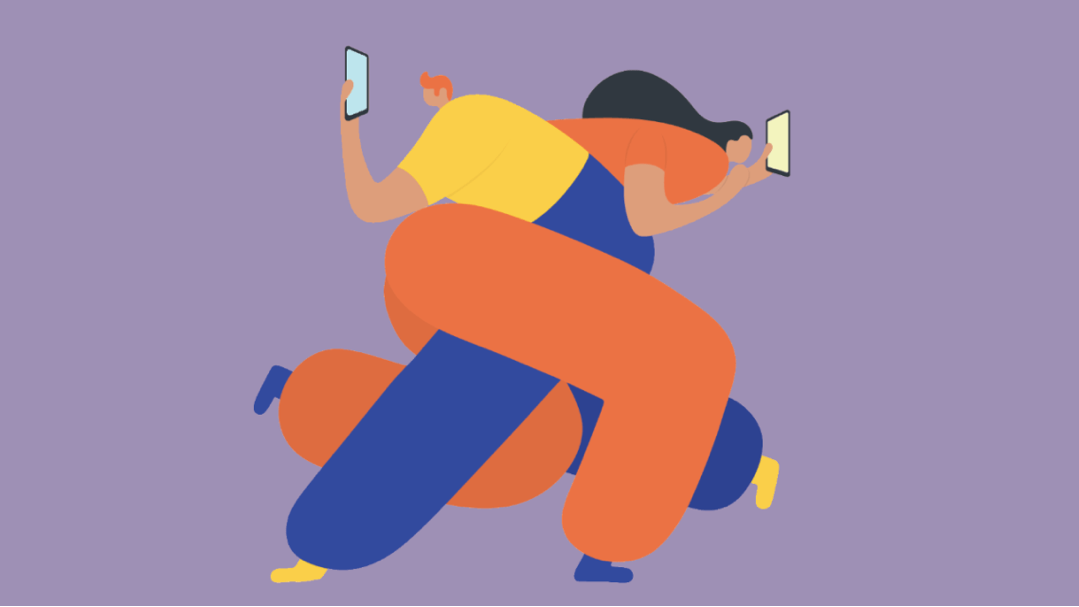Nobody likes feeling disconnected, whether it’s from our friends, family, money, the news or even the most recent Instagram reels. Our cellphones are mediums that connect us to these things; the world is now literally in our palms. And this feeling of being connected, being in the now and of being everywhere all at once can be empowering, but sometimes, even addictive. When its presence becomes addictive, its absence creates anxiety…And this is exactly what NoMoPhobia is.
The term is an abbreviation for “no-mobile-phone phobia,” which was coined during a 2010 study by the UK Post Office. A study including 145 medical students from India found evidence suggesting that 60% of participants had moderate nomophobia. For 17.9% percent of participants, nomophobia symptoms were moderate, and for 22.1 percent, symptoms were severe.
Before you go into a spiral of worry about whether you’ve got this phobia or not, just a disclaimer that all research around the issue is relatively new, and this blog is written with the aim of informing you about it so that we can start a conversation about the mindful use of our mobile phones rather than create a guide to diagnosing ourselves.
Emotional symptoms of NoMoPhobia could look like:
- worry, fear, or panic when you think about not having your phone or being unable to use it.
- anxiousness and agitation if you have to put your phone down or know you won’t be able to use it for a while.
- panic or anxiety if you briefly can’t find your phone.
- irritation, stress, or anxiety when you can’t check your phone.
Most of us relate to a few or more of these to varying degrees. So why do we feel the need to desperately cling to our phones? To bring them with us literally everywhere (yes, we’re even talking about the shower and the washroom)?
Fear of Isolation:
If your phone is your main medium of connection with your loved ones, it’s likely that you would feel anxious without it. However, have you noticed yourself feeling anxious about not having your phone even when you’re surrounded by people whose company you enjoy? That could be coming from another worry:
Fear of being unreachable:
Yes, you’re with people whose company you enjoy but what about other people who aren’t with you during that time? What about that game score? What about your friend’s Instagram stories? What about the news, your work emails, your to-do list for tomorrow, and that calorie tracking app?
But…what about the present moment that you’re currently in? What about the conversation that’s going on? The world in our palms distracts us from the world we’re experiencing, and prevents us from enjoying it to the fullest. According to a study in the United States, 34% of participants admitted to answering their cell phone during moments of intimacy with their partner!
The need for being everywhere all the time leaves us nowhere. So what can we do if we feel like we’re constantly thinking about what’s going on with our phones?
Unplug realistically:
I personally cannot switch off my phone and sleep peacefully knowing I might be absolutely unreachable. It helps to switch off the data on my phone instead, and I find it comforting knowing someone can call if it’s (really) urgent.
So being honest with yourself about how anxious you get without your phone is important. Ask yourself (without judgement) how you feel when your phone is not on you, when it’s in another room, or if it’s not working. It’s okay if the answer is an affirmative, you can take control in different situations, and make it work one step at a time. However if these questions cause you to feel distressed or anxious, seek professional help so you can cope better!
Let yourself scroll mindlessly (yet mindfully)
You don’t have to stop scrolling mindlessly, but when you do, do set a timer. Forcing yourself to stop cold turkey will only make you feel guilty when you can’t match up to unrealistic standards.
Scrolling is fun because it’s supposed to be, because it’s not an evil, brainwashing, mind-numbing activity. So enjoy scrolling mindlessly, let your brain switch off, but set an alarm for it to switch back on again. If you feel like it’s increasingly becoming a way for you to distract, isolate, or numb your feelings, start by addressing that and try to think of other mindful ways to relax or de-stress!
Switch it up:
We often find ourselves using our phone in our free time because what else is there to do? So if you feel the same way, make a list of things that you can do without your phone (you can also cheat a little with music on your phone, or a reference picture to draw from etc, but try to keep your notifications off)
The pressure of staying connected (while also balancing it out by taking appropriate time off) can be overwhelming. We’re all trying to figure out what works best for us, so striking the right balance all the time can push us into a cycle of trying to fix everything simultaneously. So if you realise that your phone usage might be creating problems for you, give yourself time to moderate the time you spend together instead of berating yourself for it.
Just make sure you have your notifications on for that crucial reminder!
Meet The Author

Sanjana (she/her) has recently graduated with a degree in Psychology and is interning at The Thought Company to gain more knowledge and experience on her path to becoming a mental health professional. She is interested in understanding what makes people resilient in the face of adversity. She has a knack for cooking, origami and re-reading Khaled Hosseini books. Her favourite way to de-stress is watching a Pixar movie curled up next to her dogs. If she could be any Pixar character, she’d be Remy from Ratatouille!
-Sanjana Lamba, Intern







